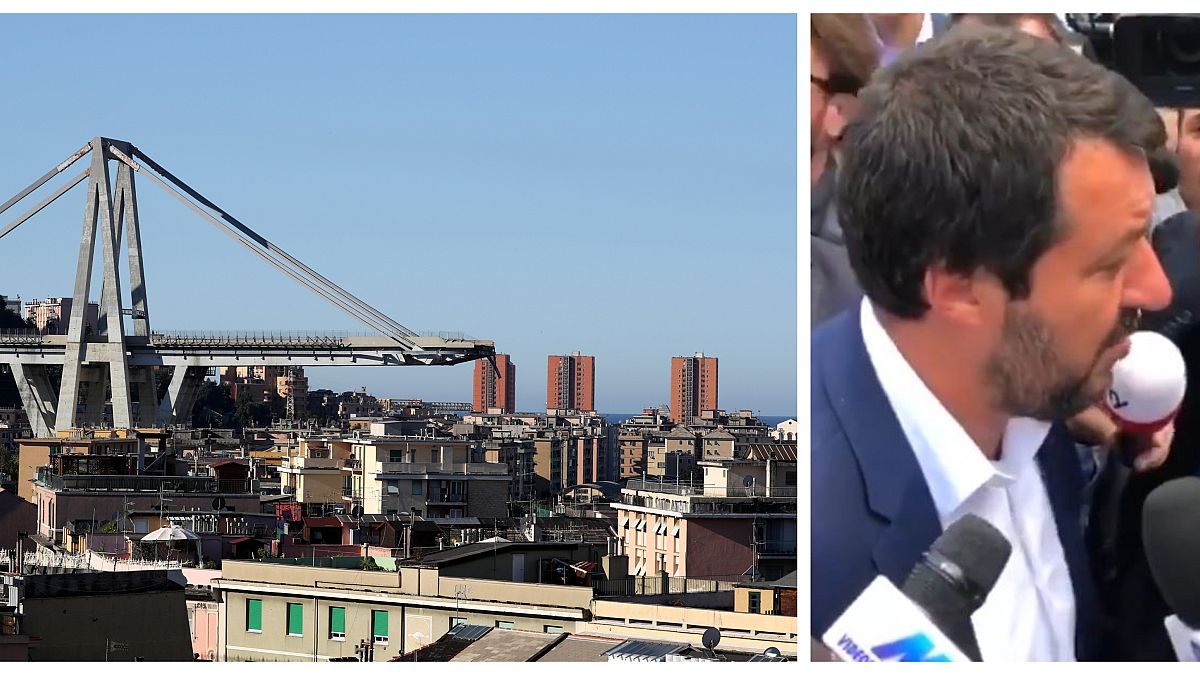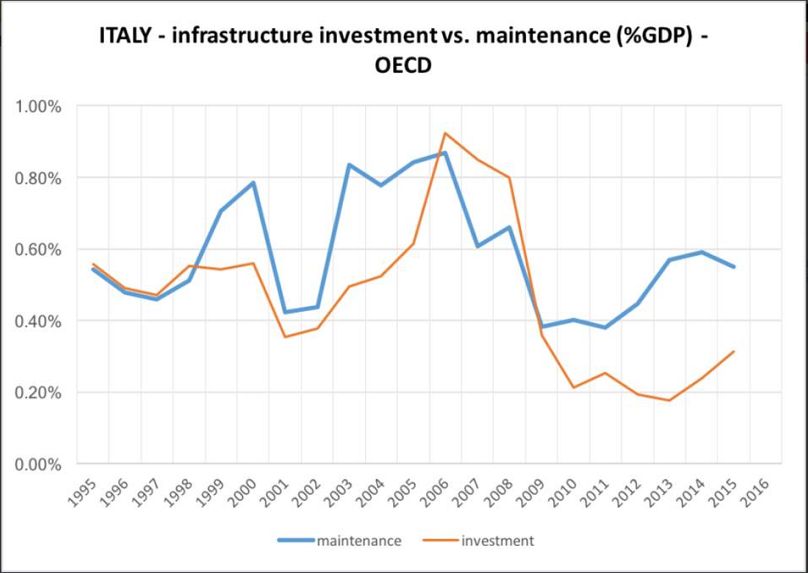Did the EU's fiscal rules contribute to the Genoa bridge collapse? Or does the buck stop with the Italian government?
Earlier this year Emmanuel Macron hit out at European leaders who he claimed were quick to blame Brussels the moment anything went wrong at home.
"To accuse Brussels and Strasbourg of every ill … might be more comfortable, but it will not solve any problems", said France’s pro-EU president.
Hours after a deadly bridge collapse in Genoa, Italy’s deputy PM, Matteo Salvini, appeared to do exactly that.
He tweeted: “If there are European constraints that prevent us from spending money to secure the schools where our children go or the highways on which our workers travel, we will put the security of Italians in front of everything and everyone.”
What could Salvini be talking about?
Salvini, leader of the right-wing League party, is referring to EU fiscal rules that put restrictions on spending to prevent debt from getting out of control.
According to the 2012 Stability and Growth Pact, government debt in each member state must not exceed more than 60% of gross domestic product (GDP), and the deficit must not be more than 3% of GDP.
Failure to be within those metrics means the member state falls under EU surveillance and must comply with EU decisions on how best to tackle the debt.
Italy is one of the most indebted countries in the EU with its debt totalling 132% of GDP.
However, while the EU may put a cap on how much a government can spend, it does not indicate how member states ought to do it.
Does Salvini have a point?
According to Veronica Vecchi, a professor of public management at Bocconi University, Milan, although spending restrictions exist in Italy, Rome has in the past chosen to pass them onto the regions by cutting their budgets.
Vecchi told Euronews that the cuts forced cash-strapped local authorities to make deals with the private sector.
Settimo Martinello from 4EMME, a company that carries out bridges' inspections, told Euronews that local authorities "are understaffed and have no money to do a census of all the bridges falling under their jurisdiction".
Martinello estimates that there are about a million bridges in the country but his company's database — the only existing one in Italy — contains only 50,000 to 60,000 of them.
"If there are serious issues on 1% of them, that would make around 10,000 bridges in urgent need of maintenance," he explained.
"Ninety percent of local administrations have not spent any money to verify the condition of their bridges and infrastructure, and whoever has money has spent very little," he emphasised.
Autostrade, part of the infrastructure group Atlantia, was the firm that had the contract for maintaining the 50-year-old bridge that collapsed in Genoa.
"In the specific case it is a contract under the responsibility of the Ministry of Infrastructure,” Vecchi said.
It is, therefore, the deal made with the private sector that should be looked at in the light of the disaster, she added.
Autostrade says it had carried out regular and sophisticated checks on the structure and they had not shown up any signs of trouble.
However, Italy’s transport minister has called for the company’s top management to quit.
EU funds to Italy
For Wolfango Piccoli, co-president of political risk consultancy firm Teneo Intelligence, “the idea that the EU is responsible for what happened (in Genoa) is mere political scaremongering".
“Europe doesn’t run a bridge policy, they don’t determine how much money each member state should allocate to infrastructure spending, that’s decided by member states.”
Especially given that Italy has benefited from EU structural funds, Piccoli highlighted.
In a statement addressing Salvini’s criticism, the European Commission said Italy had been one of the main beneficiaries of Brussels' fiscal flexibility, which had allowed it to “invest and spend much more in recent years”.
“Over the 2014-2020 period, Italy is set to receive around €2.5 billion under European Structural and Investment Funds for investments in network infrastructures, such as roads or rail,” it said.
“In April 2018, the Commission also approved under EU State aid rules an investment plan for Italian motorways, which will enable around €8.5 billion of investments to go ahead, including in the Genoa region.
“In the immediate aftermath of this tragedy, our thoughts are with the victims and the emergency services at the scene, as President Juncker expressed in his statement on August 14.
“The commission is in close contact with the national authorities conducting the investigation and stands ready to provide any necessary assistance. We will not engage in any political finger-pointing.”
Maintenance over new infrastructure
The problem, Piccoli told Euronews, is that “very often Italy failed to actually absorb all these (EU) structural funds because of an incapacity to put together projects to be able to use these funds.
“Any kind of meaningful infrastructure project in Italy needs political capital. For a very long time, the preferred option was to do maintenance.
“That is why Italy spends a fortune on maintenance - much more than lots of other member states in the EU - rather than building new infrastructure”, he said.
Additionally, Piccoli deplored the fact that the southern European country never created an authority in charge of overseeing the work of motorway operators.
“In other words, the government never paid attention to whether maintenance was done properly or not”, he pointed out.

